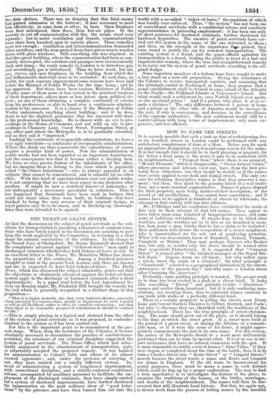THE TICKET-OF-LEAVE SYSTEM.
Ar last the discussion on the subject of penal servitude as the sub- stitute for transportation is assuming a character of common sense. Some who have lately joined in the discussion are assisting to per- form the work neglected by the Committee, in reducing to a clear shape the natural conclusions of the evidence. In his charge to the Grand Jury at Chelmsford, Mr. Baron Bramwell showed that the complaints advanced against " ticket-of-leave " men apply to discharged criminals whether they hold tickets-of-leave or not. In an excellent letter to the Times, Mr. Monckton Milnes has shown the proportions of this confusion. Among a hundred prisoners brought to trial at the present York Assizes, only three are known and one is suspected to have held tickets-of-leave. The Daily News, which has discussed the subject admirably, points out that the objections so obstinately advanced against the ticket-of-leave system apply to the discharge of hardened criminals after a short imprisonment. In a paper read before the Law Amendment So- ciety on Monday night, Mr. Frederick Hill brought the remedy for the evil which is generally recognized to a distinct shape in this proposition- " That it is highly desirable also that every habitual offender, especially when convicted of a serious crime, should be imprisoned for such a period as will in all likelihood suffice to effect his complete reformation ; and that when there is no reasonable prospect of reformation he should be confined for life."
—This is simply placing in a logical and abstract form the effect of the system of penal servitude as it was proposed, in contradis- tinction to the system as it has been carried out.
For this is the important point to be remembered at the pre- sent stage. When, from the resistance of the Colonies, it became absolutely necessary to discontinue the practice of convict-trans- portation, the reformers of our criminal discipline suggested the system of penal servitude. The Home Office, which had reluc- tantly acquiesced in the abandonment of transportation, quite as reluctantly accepted the proposed remedy. It was handed for administration to Colonel Jebb and others of its almost avowed opponents ; and, under the pretence of carrying it out, they have carried out a totally: different system. In- stead of administering a system of lengthened imprisonment, with correctional discipline, and a strictly-enforced conditional release, accompanied by auxiliary measures to facilitate the em- ployment of the discharged criminals they have simply carried out a system of shortened imprisonment, have further shortened the incarceration on the most ordinary show of "good beha- viour" by the prisoner, and have then turned him out into the world with a so-called "ticket-of-leave," the condition of which was hardly ever enforced. Thus, "the system" has not been one of correctional servitude with a conditional release and auxiliary superintendence in procuring employment; it has-been one only of short sentences for hardened criminals, further shortened for hardened hypocrites. The enemies of' penal servitude have car- ried out this system in the name of the one intrusted to them.; and then, on the strength of the experience thns gained, they turn round to justify the cry for renewed transportation. The existing system is a fraud, and the quasi-official agitation for transportation is a fraud, leading the public to trust in a bad and impracticable remedy, where the true and straightforward remedy is to carry out the system of penal servitude according to its ori- ginal design.
Some ingenious members of a forlorn hope have sought to make a last stand on a new-old proposition. Seeing the reluctance of the Colonies to receive transported convicts, and assuming that the criminals cannot be discharged at home, they propose that a penal establishment shall be formed in some island of the Atlantic or the Pacific—the Falkland Islands or Vancouver's Island. But what would such a settlement be, save Norfolk Island over again, or else an island prison ? And if a prison why place it at so re- mote a distance ? The only difference between a prison at home and a prison on the other side of America would be increase in the cost, if only in conveyance and decrease in the surveillance of the supreme authorities. The new settlement would still be a convict-prison with long terms of imprisonment, only more ex- pensive, and less efficient.
































 Previous page
Previous page